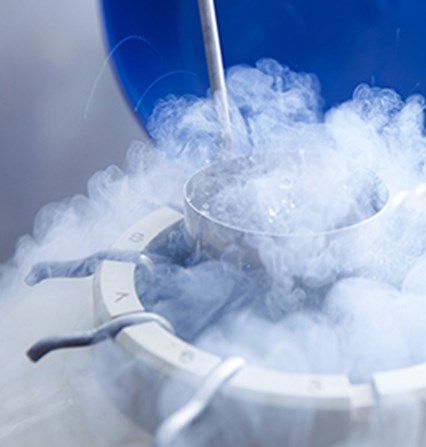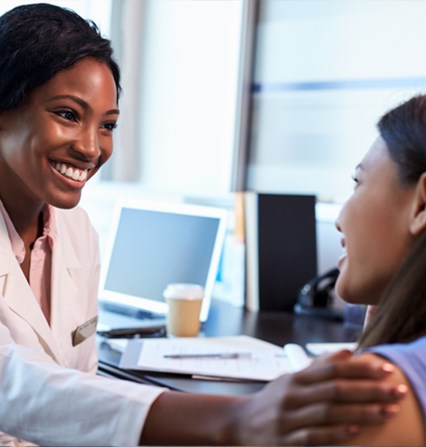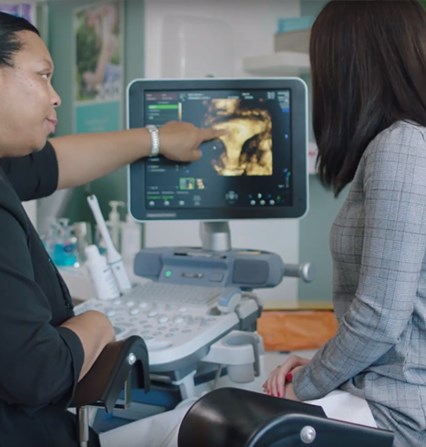What is our Egg Freeze and Share Programme?
With ‘Freeze and Share’, we provide you the chance to freeze your eggs for future use whilst helping another woman to have a baby using donor eggs.
By choosing ‘Freeze and Share’ you will keep half the eggs collected and store mature eggs suitable for your future treatment, while donating the other half to someone who needs them. Your egg freezing cycle is free of charge, and you pay £750 towards screening tests and medication. Outline costing information is given below and full information will be provided to you before choosing to go ahead.
‘Freeze and Share’ gives you the chance to help another woman or couple and to have treatment at a reduced cost.
If you have any questions about Freeze and Share or how to start treatment please contact our experienced team who will be happy to help.

Why consider egg freezing?
Women’s fertility begins to decline as they reach their mid-thirties where their eggs naturally begin to decline in quality and quantity.
When you freeze your eggs, you can improve your chances of conceiving at a later date by storing eggs from a younger age, when they are healthier and higher in quantity. These stored eggs can be thawed later and used in treatment, with the success rates depending on your individual circumstances.
Our team have many years of expertise in egg freezing treatment. In recent years, the development of new vitrification ‘Fast Freezing technology’ for egg freezing has made the treatment more successful, with survival rates of over 80% for frozen eggs. Although there is no guarantee that freezing eggs will result in a pregnancy, the process can greatly increase your chances of success in later life.
For many women, this is an empowering decision and one that puts them in control of their fertility at a time of their life when circumstances may not be right to start a family.

Why choose ‘Freeze and Share’?
Donor eggs can often be the only hope for many women hoping to conceive, and unfortunately there is a huge shortage of donor eggs in the UK. For women who have a low egg reserve in their ovaries, those who have experienced menopause, or been made infertile after cancer treatment, egg donation can often be their only hope of having a family. By sharing your eggs, you’ll become part of a very special group of women who are transforming the lives of those suffering with fertility problems.
What's included in 'Freeze & Share' package?
You’ll help other women, and receive one egg freezing cycle, scans and blood tests free of charge, and pay £750 towards medication and donor screening.
Our abc Freeze & Share includes:
- Treatment consultation
- Screening tests (Hepatitis B, Hepatitis C & HIV)
- Monitoring scans & blood tests (Oestradiol & Luteinizing Hormone)
- Ovarian stimulation and trigger medication
- Counselling (elective)
- Expert clinical advice
- Egg collection & sedation
- Follow up consultation
- Egg freezing by vitrification (fast Freezing technology)
- 1 year storage
*The package contains specified medication and services. There may be situations where additional tests, treatments or medicines are required which are not included within our cycle package. These will be chargeable. See full details of estimated treatment cost, package inclusions and exclusions.
Frequently asked questions
Is there a limit to the number of times I can use the ‘Freeze and Share’ package?
We suggest that a woman may want to consider 2-3 cycles to give them the best chance of freezing a good number of eggs. We limit patients to a maximum of 3 freeze cycles.
Is there a minimum number of eggs that must be collected for me to proceed with a ‘Freeze and Share’ cycle? What happens if you are unable to collect enough, am I liable for the cost of the treatment?
Am I financially or legally liable for children born as a result of my donation?
No. The recipients of your eggs are the legal parents of any children born, and you have no financial or legal responsibility.
How do we define our key statements
What we mean by ‘Low Cost’
abc IVF are a provider of high quality, ‘low cost’ fertility treatment. We define ‘low cost’ as meaning that our prices are at least 25% lower than the average cost of a cycle of IVF in the UK. We have determined the average cost of one cycle of IVF in the UK as being £5,000 as reported by the Competition and Markets Authority and the Human Fertility Embryo Authority (HFEA), the UK’s fertility sector regulator in September 2022 <link>. It is our aim to continue to be a ‘low cost’ IVF provider and keep our costs below other providers in the UK.
What we mean by ‘High Quality’
abc IVF are a provider of ‘high quality’, low cost fertility treatment. We define our treatment as 'high quality' based on a number of key measures and processes:
1. That our licensed centres achieve inspection ratings of 4 or 5 out of 5 by the Human Fertility Embryo Authority (HFEA), the UK Fertility regulator.
2. That our clinics have fully trained GMC and NMC registered Nurses, Doctors and Consultants supporting them.
3. That our facilities are modern and fully compliant with the current clinical guidelines.
4. That we use modern technology and equipment from leading manufactures.
What we mean by ‘Excellent Success’
abc IVF deliver ‘excellent success’ for our patients. We know that clinic’s success and success rates play an important roles in patients decision on which clinic to choose for their treatment, so we aim to be clear and transparent about how we define 'excellent success'.
The Human Fertility Embryo Authority (HFEA), the fertility sector regulator, displays on their website the verified data for clinical pregnancies and live births for every licensed clinic in the UK for the last few years. They provide a number of points of analysis for each clinic to show the key success measures for broad and specific age groups. abc ivf is a satellite clinic of the HFEA licensed clinic - Create Fertility, whose results can be found on the HFEA website (LINK). abc patients have their egg collection and embryo transfer procedures at the CREATE Fertility licensed centre, by Create Fertility clinicians, and as such the success rates noted for abc IVF clinics are those of the licenced Create Fertility centre where treatment takes place.
We define “excellent” as exceeding national average success performance for live births per embryo transferred for all ages for the majority of clinics within the group, as shown on the latest verified year of data displayed on the HFEA website. Full details and further data can be found here.
In terms of your fertility health, you’ll need to have both ovaries intact, with good egg reserve. Our screening will include a blood test to check your hormone levels and screen for any conditions that might prevent you sharing your eggs. The assessment will give you a detailed picture of your fertility health.
When you are thinking about donating eggs there is a lot to consider, including the fact that children born of donor eggs have the right to identifying information about their donors once they reach the age of 18.
We want you to be sure donating is the right decision for you. We offer every potential donor the opportunity to speak to an independent counsellor so you can be sure that you are comfortable with donation. You will also be provided with a copy of the agreement with us, setting out all the terms of the arrangement: this will need to be signed by you before treatment commences. We will go through the agreement with you to ensure you understand it and to give you an opportunity to ask any questions.
We appreciate the decision to share your eggs is a big one, and you’ll have the chance to speak to a specialist fertility counsellor to make sure you understand what donation means for you and your family. Our team will be with you at every step to answer any questions you have.
After the procedure, we will let you know how many eggs have been collected. Half of the eggs will be kept for you (the donor). The mature eggs suitable for freezing are then stored for future use when you’re ready to start a family. The remaining half are donated to a matched recipient. If there’s an odd number then the extra egg will be stored for you.
What happens after I share my eggs?
The eggs you have shared will be stored before they are matched with up to a recipient. Your generous gift has the potential to transform the life of someone who would otherwise have a much-reduced chance to conceive.
After your donation, you can choose to write a pen picture with a short description of yourself and a goodwill message for the recipient of your eggs. The women who receive your eggs will receive basic non-identifying information about you to help the matching process. By law, children born of donor eggs or sperm have the right to identifying information about their donor when they reach adulthood.









